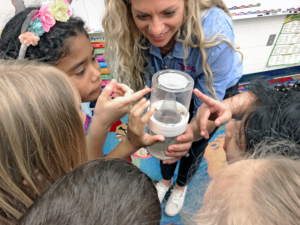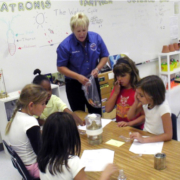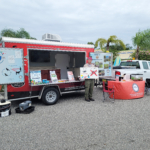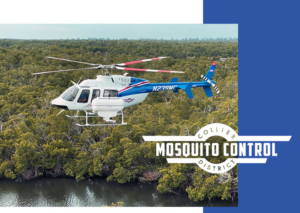Mosquito Management What’s working, what isn’t in the South Atlantic Region
“While it is wise to learn from experience, it is wiser to learn from the experiences of others.” Rick Warren
by Robin A. King, Director of Communication, Collier Mosquito Control District South Atlantic Representative, AMCA Public Relations Committee
Yes, that’s Rick Warren, a well-known Christian pastor, but this quote is not intended to evangelize anything other than a simple truth: sharing of information often leads to growth.
Sharing strategies and tactics is exactly what several mosquito control districts did in the South Atlantic Region of the American Mosquito Control Association (AMCA) when they were recently asked about their community engagement programs. From presenting lessons in local classrooms to participating in community events with information tables, these districts shared the ways they interact with residents as they strive to increase public knowledge and awareness of mosquito control operations.
The AMCA reinforced how important community engagement is to a successful integrated mosquito management (IMM) program in its 2021 version of the revised “Best Practices for Integrated Mosquito Management.” The document includes a newly added 13-page section on community engagement providing helpful tips on creating a community engagement strategy, key points on creating impactful materials, and measuring the effectiveness of these efforts.
Given that districts have varied sizes and resources available for outreach, the tips are easily scalable. Simply put, there is not a “on-size-fits-all” when it comes to mosquito control districts. For some, launching a social media presence may be the correct strategy, and for others, a branded door hangar using simple language or pictures on how to reduce backyard mosquito habitat may be the best step forward. Regardless of the budget or the number of personnel available for outreach, strategies that increase awareness of mosquito control operations is done so with the goal of fostering public trust.
The following AMCA South Atlantic region mosquito control districts readily shared what’s working and what isn’t in their respective community engagement efforts. Their information was presented at the AMCA 88thAnnual Meeting in Jacksonville, Fla., and are featured here.
The first question in the survey asked how receptive their communities are to mosquito control operations, from a scale of 1 (lowest) to 5 (highest). Among the 12 districts that responded, the overall score was 3.8 percent. Specific responses included:
- If they are aware of us, then they are extremely supportive for the most part.
- Many are not aware of what we do.
- A good number of folks that know what we do take use for granted and don’t accept responsibility for taking proactive anti-mosquito measures on their own property.
- There are those that support the effort but question the materials used, and there is a small percentage that claim mosquito control isn’t necessary.
The most common responses noted challenges presented by the COVID-19 pandemic: cancellations to school participation, community events, and sporting events. For some, even though their in-person activities were cancelled, they adapted by switching to virtual participation when possible.

Collier Mosquito Control District Public Outreach Specialist Andrea McKinney presents in a local classroom.
Adaptation is a vital component of community engagement, demonstrating the willingness to evolve and adjust the strategies to ensure effectiveness. That’s why some type of measurement is valuable in determining success. For example, obtaining feedback through conversations, asking questions following an education lesson, and tracking the number of residents who engage during an in-person event are easy ways to gauge the success of outreach efforts.
Troublesome outreach strategies– and their solutions – cited by others included:
- Brevard County Mosquito Control District (Fla.) attempted to team up with their county to launch a social media presence, but they quickly learned the initiative required a more focused strategy and resources. Specifically, when treatment notifications were posted, they were “bombarded by complaints and public records requests” which left little time for overseeing the social media program. Their solution was to table the initiative until they can add resources to adequately answer their public’s concerns and questions. At that time, the strategy will include “easing into” social media with soft topics.
- Social media also posed a problem for the Florida Keys Mosquito Control District because the public isn’t engaging with it as readily as they hoped. Even though early survey results provided a good baseline of where residents preferred to obtain their news, they weren’t engaging with the District’s social media. To grow their audience and encourage engagement, their social media strategy is trying different types of information to hit upon the most relevant and sought-after content.
- Mosquito Management Services of Hillsborough County (Fla.) found that effectively communicating with their public about adulticide treatments – both by ground and by air – were problematic when performed manually, so their solution was to develop an automated messaging system.
When asked for examples of successful outreach and engagement activities – and how they measured the success —many South Atlantic Region districts cited their education programs.
- Beach Mosquito Control (Fla.) points to their education outreach which began 15 years ago. They measure success by the low number of service requests they receive, as well as the community-wide recognition by children (and parents) of Cindy Mulla, “The Mosquito Lady,” who regularly visits them in the classroom.
- A fully equipped education trailer and in-school programs are working well for Pasco County Mosquito Control (Fla.) according to their “Mosquito Lady,” certified teacher Jillian Meek. She’s used surveys to measure the program’s effectiveness and gauges success by the number of schools that re-book her presentations. As well, she reports that during the past five years, they have seen a marked reduction in the number of citizens who are more receptive and ready to engage in conversation during community outreach events.
- The County of Volusia Mosquito Control Division (Fla.) reports that their most successful
education program is their education trailer, which they take to as many community events as possible including summer camps. It’s equipped with microscopes, cages of live mosquitoes, educational pamphlets, containers of mosquito fish, and sometimes even a sentinel chicken. The program’s success is measured by the number of citizens they reach, which is recorded in their work management system.
- Collier Mosquito Control District (Fla.) indicates that their in-school programs and participation in community events are two of their more successful ways of engaging with residents and visitors. They base success of their efforts on the number of school children reached each year (>3,300 in 2019) and the number of events they participate in each year (56 in 2019).
Participation by staff in community events was also cited by numerous districts as their most successful engagement activity:
- Mosquito Management Services, Hillsborough County, credits their mosquito fish giveaway events and their annual media day as their most effective way to engage with their community. During the giveaways, they track the number of citizens who receive bags full of the mosquito fish (citizens also receive educational materials and branded items such as flyswatters, pencils, and chip clips). Each June, their media day prior to Mosquito Awareness Week provides an opportunity for reporters to see an aerial insecticide demonstration, tour the research lab, and learn more about mosquito fish and sentinel chickens. Success is gauged by the number of media outlets that run stories about the event.
- A new outreach program began in 2021 at Citrus County Mosquito Control District (Fla.) and they report success in their strategies developed for specific audiences: children at summer camps, civic clubs, and children’s clubs. Children are quizzed at the end of presentations to determine whether the engagement was effective.
- Brevard County Mosquito Control District (Fla.) reports that their community partnership with the county’s Parks and Recreation Department has been a “driving force” in the growth and success of their educational outreach efforts. From touch-a-truck events to after-school programs, they have doubled their participation in the number of events that provide an opportunity to reach their public. They also cite that a unique partnership has developed where they fund 50 percent of an agricultural agent’s position (the rest is funded by University of Florida). This agent attends most of their events to assist with outreach.
- Hernando County Mosquito Control (Fla.) has also found that partnering with another community organizations has boosted their community engagement success. They join forces with their county’s Florida Friendly Landscaping events to reach those who are outdoor-oriented and appreciate the tips to reduce mosquitoes while enjoying gardening activities. Participation in other community partners’ events such as Swampfest and the Sheriff’s Night out provide additional venues where residents can learn about mosquito control operations and services. The success of these programs is measured by the level of interaction and the “great questions” that are asked.
- The Florida Keys Mosquito Control District outreach and engagement efforts during the past year focused on their goal of launching the EPA-supervised “Experimental Use” of the Oxitec genetically modified male mosquitoes. Thanks to their partnership with Oxitec, the outreach included multiple channels such as billboards, direct mail, and door-to-door canvassing. They report that these extensive community engagement strategies resulted in successfully carrying out the pilot program without delay.
After a review of these districts’ community engagement activities, it’s hoped that others may be inclined to adjust an existing program to improve effectiveness or to take that first step in engaging their public. Have questions? Reach out to the districts mentioned here and keep the sharing – and growth – expanding though our industry.
Featured Photo: Beach Mosquito Control’s “The Mosquito Lady” Cindy Mulla in the classroom







Leave a Reply
Want to join the discussion?Feel free to contribute!